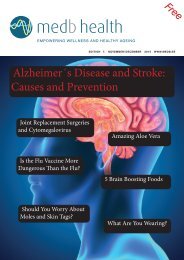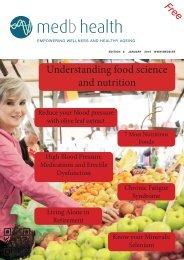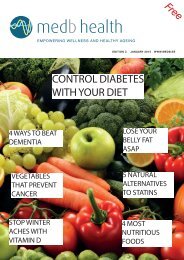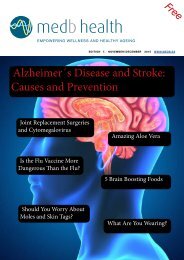You also want an ePaper? Increase the reach of your titles
YUMPU automatically turns print PDFs into web optimized ePapers that Google loves.
News and In<strong>for</strong>mation<br />
Higher Levels of Magnesium protects against heart d<strong>is</strong>ease<br />
A new study by scient<strong>is</strong>ts at <strong>the</strong> National Institute of Cardiology in Mexico City which involved<br />
1300 participants, found that people with <strong>the</strong> highest average blood levels of Magnesium where<br />
nearly 50% less likely to suffer from high blood pressure, and 42% less likely to suffer from<br />
hardening of <strong>the</strong> arteries. The study publ<strong>is</strong>hed in The Nutrition Journal confirms <strong>the</strong> findings of<br />
several o<strong>the</strong>r studies.<br />
Magnesium plays an important role in over 300 chemical reactions in <strong>the</strong> body. It <strong>is</strong> required <strong>for</strong><br />
relaxing <strong>the</strong> body, especially relaxing <strong>the</strong> blood vessels, muscles and lungs. Magnesium helps <strong>the</strong><br />
body regulate blood pressure by helping to relax <strong>the</strong> arteries.<br />
One major contributor to hardening of <strong>the</strong> arteries <strong>is</strong> high levels of calcium in <strong>the</strong> body.<br />
Magnesium neutral<strong>is</strong>es calcium, and by doing so, helps prevent<br />
hardening of <strong>the</strong> arteries. Magnesium <strong>is</strong> also<br />
important <strong>for</strong> regulating <strong>the</strong> heart rhythm.<br />
The best food sources of magnesium are leafy greens such<br />
as spinach and chard, beans and seeds. Magnesium malate<br />
<strong>is</strong> <strong>the</strong> best absorbed <strong>for</strong>m of magnesium supplement.<br />
Know Your Minerals: Vitamin E<br />
Vitamin E <strong>is</strong> a blanket name <strong>for</strong> eight different chemical compounds. 4 of <strong>the</strong> compounds are called tocopherols,<br />
and <strong>the</strong> o<strong>the</strong>r 4 are tocotrienols. The most known <strong>for</strong>m of Vitamin E <strong>is</strong> alpha-tocopherol. It <strong>is</strong><br />
also <strong>the</strong> most abundant <strong>for</strong>m of Vitamin E in our diet. O<strong>the</strong>r <strong>for</strong>ms of Vitamin E are also found in foods.<br />
Vitamin E <strong>is</strong> available in a syn<strong>the</strong>tic <strong>for</strong>m and most Vitamin E supplements contain syn<strong>the</strong>tic vitamin E.<br />
The natural <strong>for</strong>m of Vitamin E <strong>is</strong> better absorbed than <strong>the</strong> syn<strong>the</strong>tic <strong>for</strong>m.<br />
It <strong>is</strong> possible to differentiate <strong>the</strong> <strong>for</strong>ms of Vitamin E from <strong>the</strong>ir names. For instance, natural vitamin E<br />
may be labelled as d alpha tocopherol, while <strong>the</strong> syn<strong>the</strong>tic equivalent will be labelled dl-alpha tocopherol.<br />
Vitamin E <strong>is</strong> a powerful antioxidant and protects <strong>the</strong> body against <strong>the</strong> harmful effects of toxins. Toxins are<br />
<strong>the</strong> underlying cause of inflammation in <strong>the</strong> body. Vitamin E <strong>is</strong> fat soluble, and <strong>for</strong> th<strong>is</strong> reason, it prevents<br />
fats from going rancid. Rancid fats promote <strong>the</strong> <strong>for</strong>mation of plaque on <strong>the</strong> walls of arteries which leads to<br />
heart d<strong>is</strong>eases and stroke.<br />
Foods that contain <strong>the</strong> most vitamin E include green leafy vegetables such as Kale, Sw<strong>is</strong>s Chard, and<br />
Spinach. Foods with a high fat content are also good sources of Vitamin E and such foods include olives<br />
and avocados. Seafood such as shrimps and sardines contain reasonable amounts of Vitamin E.<br />
The Vitamin E contained in food degrades over time. Olive oil in a closed bottle will lose up to 30% of its<br />
vitamin E in a six month period. And with <strong>the</strong> lid open, it will lose all of its Vitamin E in 3–4 months.<br />
Heat easily damages Vitamin E and cooking olive oil will add to <strong>the</strong> loss of vitamin E.<br />
Fat Restricting diets can cause a deficiency of Vitamin E.<br />
16 www.medb.es

















